

Mr Bee - using technology to inspire, motivate and teach across the curriculum. Whole-Class Reading FAQs. Recently, my school has moved away from carousel "guided reading" lessons and we have been teaching reading skills in whole-class lessons.
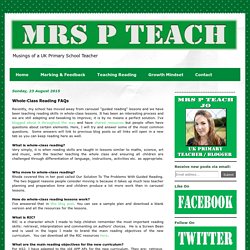
It has been an interesting process and we are still adapting and tweaking to improve; it is by no means a perfect solution. I've blogged about it throughout the way and have shared resources but people often have questions about certain elements. Here, I will try and answer some of the most common questions. Making Whole-Class Reading work for Lower Ability Readers – misswilsonsays. It’s now over a year ago since I wrote a blog post for MrsPTeach about Our Solutions to the Problems with Guided Reading.
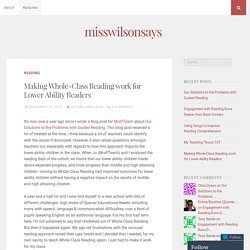
This blog post received a lot of interest at the time; I think because a lot of teachers could identify with the issues it discussed. However, it also raised questions amongst teachers too, especially with regards to how this approach impacts the lower ability children in the class. When Jo (MrsPTeach) and I analysed the reading data of the cohort, we found that our lower ability children made above expected progress, and more progress than middle and high attaining children: moving to Whole Class Reading had improved outcomes for lower ability children without having a negative impact on the results of middle and high attaining children.
Our Solutions to the Problems with Guided Reading – misswilsonsays. Nigel and the Teaching Notes for The Avocado Avenger. The Avocado Avenger is a story which is designed to be used with Year 3 and 4 during Talk4Writing English lessons.
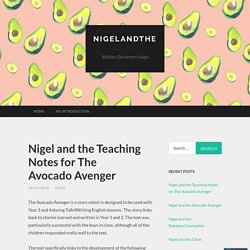
The story links back to stories learned and written in Year 1 and 2. The text was particularly successful with the boys in class, although all of the children responded really well to the text. The text specifically links to the development of the following skills: The use of fronted adverbials.The use of paragraphs to organise ideas.The use of direct speech, which includes examples of different punctuation used with speech marks (commas, question marks and exclamation marks).The use of a 5 part story to structure and develop a plot. There are a number of immersion activities which can be linked to the text. During the imitation stage of the writing process, children completed different activities: During the invention stage of the writing process, children completed one of the following tasks: Nigel and the Avocado Avenger. It’s nearly impossible to find decent Talk4Writing texts online which specifically target the needs of one’s class, whilst matching the curriculum, so writing the story yourself is sometimes the only thing to do!

Luckily this is something I thoroughly enjoy doing, which is how the following story, The Avocado Avenger, was born. The teaching notes to accompany this text will follow shortly, should anyone wish to use this with their own classes; otherwise I invite you all to enjoy the truly bonkers superhero tale of… The Avocado Avenger. Reading Miles Global Challenge. Please note the deadline for entries for this competition has now passed and a prize draw winner has now been chosen.
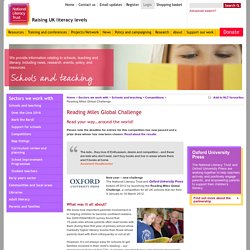
Read about the results. The kids - they love it! Enthusiasm, desire and competition - and these are kids who don't read, can't buy books and live in areas where there aren't books at home.Assistant Headteacher New year – new challenge The National Literacy Trust and Oxford University Press kicked off 2012 by launching the Reading Miles Global Challenge, a competition for all UK schools that ran from 9 January to 16 March 2012. Dear teachers, there are free #BeetleBoy learning resources for use in your classrooms here. High Quality Picture Books for Cross-Curricular Planning. A3: This is pretty useful, can download here #spag #primaryrocks. Have started a #roalddahl100 @padlet, please add #primaryrocks #ukedchat @redgierob @JennaLucas81 @gazneedle @WatsEd. Download and share X. State Schools - How To Apply - Foyle Foundation. The Foyle Schools Library Programme The majority of our funding for schools will now be directed to our flagship scheme The Foyle Schools Library Programme, which gives priority to primary schools.
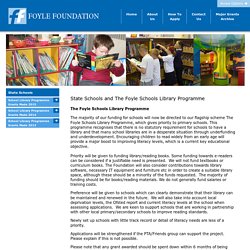
This programme recognises that there is no statutory requirement for schools to have a library and that many school libraries are in a desperate situation through underfunding and underdevelopment. Encouraging children to read widely from an early age will provide a major boost to improving literacy levels, which is a current key educational objective. Priority will be given to funding library/reading books. Some funding towards e-readers can be considered if a justifiable need is presented. Preference will be given to schools which can clearly demonstrate that their library can be maintained and renewed in the future. Newly set up schools with little track record or detail of literacy needs are less of a priority. Other Projects. Reading and Writing Scales. The CLPE Reading and Writing Scales - available FREE Supporting progression for 3-16 year olds in a 21st Century Classroom "These scales could transform English pedagogy and assessment" Dame Alison Peacock via Twitter What are the Reading and Writing Scales?
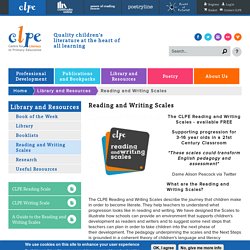
The CLPE Reading and Writing Scales describe the journey that children make in order to become literate. "Using the CLPE Reading and Writing scales allows me to step back and consider the holistic development of the children in my class as readers and writers. " I have had a few requests this week to write a Y2 Eng Unit Plan, download here for free. My latest blog: Part 2 of my blogs on English Unit Planning. My free Y3 English Unit Plan - linked to the wordless book 'Flood' #ukedchat #primaryrocks. I have written a few English unit plans. This one a three week unit. Free to download.
Literacy Shed 2 hour sample lesson - Chaperon Rouge. Delivering a staff meeting on working walls for writing tomorrow. How do you use yours? □ NEW BLOG - Using the New John Lewis Christmas Advert in Class - thanks to @ReadingExplorer. 40 Books & Films for KS2 - based on the many recommendations via Twitter. Jon Brunskill sur Twitter : "If you're nervous about the new grammar expectations this year, I'd thoroughly recommend this PPT by @PieCorbett. Slow Writing. It started with David Didau’s (@learningspy) blog post.
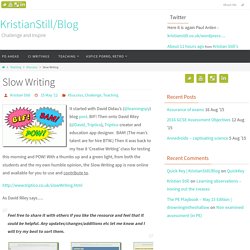
BIF! Then onto David Riley (@David_Triptico), Triptico creator and education app designer. BAM! (The man’s talent are for hire BTW.) Storybird sur Twitter : "#BacktoSchool Tips for Teachers: 7 ways to use Storybird for creative writing #engchat #edtech. Miss H sur Twitter : "HELP! Which reading display in a Y5 classroom? #NQT #classroomdisplay #reading #teaching #primary...
Miss H sur Twitter : "HELP! Which reading display in a Y5 classroom? #NQT #classroomdisplay #reading #teaching #primary... Ashley Larter sur Twitter : "Editable Big Write prompt sheets/ideas... Storybird sur Twitter : "#backtoschool tips: Struggling Readers? “Storybird” Your Text! #edtech #edchat. Rob Smith sur Twitter : "@MissSMerrill this one? I think @imagineinquiry made me buy it...
Kate sowter sur Twitter : "@redgierob @rachelrossiter 'making he most of small groups' Debbie Diller. Absolutely fab read"... Martin Burrett sur Twitter : "Create metro maps. Use in creative writing, make Monopoly games or posters. #edchat #ukedchat. Nina Jackson sur Twitter : "@bethben92 seen this #unusualwordbuddy"... Graham Andre' sur Twitter : "One for the shed Rob? @redgierob @gazneedle @bryngoodman @MrHeadComputing @bethben92 @russbrownauthor.
Rob Smith sur Twitter : "DADWAVERS to enhance writing. Read - Stories. Revisiting Slow Writing – how slowing writing might speed up thinking. Wisely, and slow.
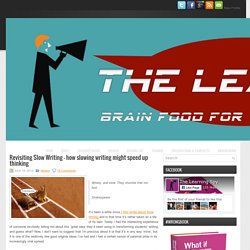
They stumble that run fast.Shakespeare It’s been a while since I first wrote about Slow Writing and in that time it’s rather taken on a life of its own. Today I had the interesting experience of someone excitedly telling me about this ‘great idea’ they’d been using to transforming students’ writing, and guess what? Now, I don’t want to suggest that I’m precious about it or that it’s in any way ‘mine’, but it is one of the relatively few good original ideas I’ve had and I feel a certain sense of paternal pride in its increasingly viral spread. I first came up with the idea when teaching an intervention class of Year 11 C/D borderline boys in about 2008. Sort of like this: And so on. I’ve come to understand that an expert writer thinks not just about what they write, but about how they write it. But novice writers don’t have this ability. This post on crafting beautiful sentences was the start of the process. Slow Writing: how slowing down can improve your writing.
NB – my latest thinking on Slow Writing can be found here.
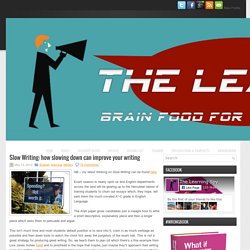
Exam season is nearly upon us and English departments across the land will be gearing up to the Herculean labour of training students to churn out essays which, they hope, will earn them the much coveted A*-C grade in English Language. The AQA paper gives candidates just a meagre hour to write a short descriptive, explanatory piece and then a longer piece which asks them to persuade and argue. This isn’t much time and most students default position is to race into it, cram in as much verbiage as possible and then down tools to watch the clock tick away the purgatory of the exam hall. Voki Home. Storybird - Artful Storytelling. Miss RQT sur Twitter : "@MissKhanRQT @MissMc_NQT dictionary board! :D...